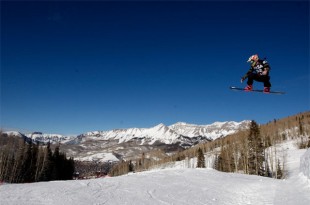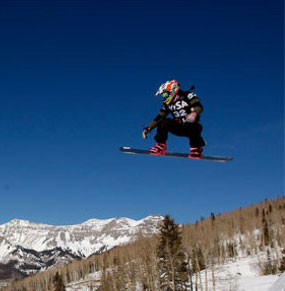 RYAN MILLER WAS SHARING A HOTEL ROOM at a Best Western In Vancouver, Canada, with his U.S. Pro Snowboard Tour teammates when his secret slipped out.
RYAN MILLER WAS SHARING A HOTEL ROOM at a Best Western In Vancouver, Canada, with his U.S. Pro Snowboard Tour teammates when his secret slipped out.
The International Ski Federation s 2000-2001 race season was kicking off, and Miller s teammates were amped and ready to party. First stop that night was a strip joint. Miller politely declined–as he had many times before–saying he was tired and arguing that there was a lot of racing coming up. The guys weren’t having it.
“What’s wrong with you?” one of them taunted. “Not go out? Are you a fag?” The others snickered. That’s when it finally hit him: Miller was done pretending.
“Yes, as a matter of fact I am,” he said, barely believing his own voice uttered the words. “And I have plans tonight, so I will see you guys in the morning.”
Adrenaline was coursing through Miller’s body as he turned and walked out of the room without looking back at his stunned teammates. He had visualized this moment for years but had never thought he would actually come out. But now it had happened, and in that after-school special kind of way.
Only two teammates would speak to him the next morning. A few weeks later he joined another team, where the coach–who cared only about results, not the sexual orientation of his athletes–announced that anyone who had a problem with Miller could find another team.
“ACTION SPORTS”–surfing, skateboarding, snowboarding, wakeboarding, freestyle BMX, motoeross–share one conspicuous characteristic: They have a hyper-heterosexual facade. Which is strange, particularly because these sports embody a rebellious counterculture, born largely from their image as disruptive and antithetical to the status quo of organized sports. Skateboarding was “a crime,” snowboarding was banned on mountains from Vermont to California, and surfers struggled to shake the stoner Spieoli stereotype.
RYAN MILLER WAS SHARING A HOTEL ROOM at a Best Western In Vancouver, Canada, with his U.S. Pro Snowboard Tour teammates when his secret slipped out.
The International Ski Federation s 2000-2001 race season was kicking off, and Miller s teammates were amped and ready to party. First stop that night was a strip joint. Miller politely declined–as he had many times before–saying he was tired and arguing that there was a lot of racing coming up. The guys weren’t having it.
“What’s wrong with you?” one of them taunted. “Not go out? Are you a fag?” The others snickered. That’s when it finally hit him: Miller was done pretending.
“Yes, as a matter of fact I am,” he said, barely believing his own voice uttered the words. “And I have plans tonight, so I will see you guys in the morning.”
Adrenaline was coursing through Miller’s body as he turned and walked out of the room without looking back at his stunned teammates. He had visualized this moment for years but had never thought he would actually come out. But now it had happened, and in that after-school special kind of way.
Only two teammates would speak to him the next morning. A few weeks later he joined another team, where the coach–who cared only about results, not the sexual orientation of his athletes–announced that anyone who had a problem with Miller could find another team.
“ACTION SPORTS”–surfing, skateboarding, snowboarding, wakeboarding, freestyle BMX, motoeross–share one conspicuous characteristic: They have a hyper-heterosexual facade. Which is strange, particularly because these sports embody a rebellious counterculture, born largely from their image as disruptive and antithetical to the status quo of organized sports. Skateboarding was “a crime,” snowboarding was banned on mountains from Vermont to California, and surfers struggled to shake the stoner Spieoli stereotype.
Considering the harried history (and progressive nature) of action sports, is it too much of a stretch to think these athletes might be more flexible regarding sexuality?
Yes, says Sonny Mayugba, founder and publisher of the online snowboarding magazine Heckler. Counterculture or not, these are still sports. “There is a closeness that gets shared when skating, surfing, snowboarding–and as open-minded and accepting as these guys claim to be, they’re not,” he explains. “The image that athletics are supposed to be for straight, ‘manly’ men carries over into action sports.”
No one knows that better than Australian Matt “Branno” Branson, the only pro surfer who has yet come out–though he dropped out of the world surf tour before he did so.
In the late 1980s, Branson was the original hard-living surf punk, as famous for his tattoos and love of punk music as he was for his surfing, which only improved as the waves got bigger and gnarlier. In four years on the pro tour, his world ranking hovered in the low 30s, but his image guaranteed him as much attention as higher-ranked surfers in the Australian media.
In 1991, he was attacked one night outside a bar. The incident had nothing to do with Branson’s sexual orientation–a drug dealer mistook him for someone else–but the surfer decided he was tired of living a lie. Only 22 and still with plenty of potential, he dropped off the tour. Over the next few years he slowly came out to friends and family.
“It was fucking incredibly hard,” he told Australian surf magazine Stab. “You always felt like you were lying. You always felt like you were putting on a charade. As a young person, it can fuck with you because you can’t progress as a person.”
Branson’s initial concern wasn’t how his friends and fellow surfers would react. “The guys on tour were fucking amazing people. Surfers who travel, they see shit, man. They learn shit. And they learn to fucking accept shit,” he told Stab. The real concern was how his sponsors would take it. Branson was the top rider for surf label Rusty, particularly because his punk rock image suited the company’s rebel attitude.
“If Branno had come outback in the day, I wouldn’t have cared,” says Rusty global brand manager Mark “Mogga” Sutton, Branson’s former team manager. “I actually believe that the industry as a whole is quite enlightened and would be accepting and supportive if a male pro surfer chose to come out.”
But that’s hard to prove. A top male surfer has yet to challenge the leading surf brands that sponsor the athletes, films, and competitive events. Filmmaker Ed Aldridge bumped up against the companies’ boundaries when making his coming-of-age film Tan Lines, about a gay teenage Australian surfer. “I tried to get sponsorship from some of the mainstream surf brands, and they all gave a very quick ‘no.’ They didn’t even try to be politically correct about it–it was more like ‘no way,’ “Aldridge says. “When the movie came out we got feedback from the surf community. In the surf press it was mainly cheeky homophobic stuff, if they even paid attention at all.”
One top-ranked female pro surfer who spoke anonymously says coming out isn’t worth the price she’d inevitably pay in lost endorsement deals. “I am still having too fun of a time traveling the world to risk losing it all,” she explains. “Unless you’re in a place where you want to be a role model for gay people, your private life is your private life.”
THERE ARE THREE PRIMARY reasons Laurie Currier’s dream of becoming a pro slope-style snowboarder could have failed. One, she’s a woman in a sport where most sponsorship money goes to men. (Slope style is a form of freestyle snowboarding in which the rider chooses his or her way through a course laden with bumps, rails, and jumps. It’s tough. Slope-style snowboarders regularly blow out knees on huge jumps and knock themselves out on miscalculated handrail slides.) Two, she was born without a left hand–which she often has covered with a glove, so most people don’t notice. And three, she’s gay.
Out practically from the beginning of her career, the 23-year-old sees being gay as well as her other “disadvantages” as assets. “If anything, it has all helped me stand out a little more, because I am so open about it,” says Currier, who made a name for herself this year when she won the prestigious Volcom North American Peanut Butter and Rail Jam at California’s Mammoth Mountain and landed among the top 10 in the Vail Sessions the same season. “It makes me different than the other pro girls. I would imagine it would be a lot harder for a guy.”
Curriers combination of results and personality is why Mountain High Resort in Southern California has sponsored her for the last four years. “There are so many reasons why she’s such a good representative for us,” says the company’s marketing director John McColly. “Not only is she attractive, outgoing, and flamboyant, but she loves snowboarding. Her sexuality is just another part that folds into why she’s unique. And because she’s always been open about being gay, we’ve never given it much thought.”
While many involved in marketing action sports say they wouldn’t have an issue with seeing a gay athlete like Currier promoted, few have actually been faced with a decision whether to take that leap. “In my 30 years in snowboarding, I can’t recall ever having one conversation on how to address the gay market,” says Brad Steward, director of marketing at Salomon Snowboards. “I think more than some sort of ignorance, prejudice, or opinion, gays haven’t been marketed to because the market doesn’t know if there’s traction and profit there or not.”
“Action sports attract a certain personality, which may or may not line up with the gay male personality,” says Greg Randolph, communications manager of goggles company Smith Optics. “It’s a collection of sports that are really aggressive, and the personality that is drawn to them isn’t probably the typical gay personality.” But, he says, homophobia isn’t confined to action sports. “If you look at male sports in general, you can’t think of too many where being gay is a good career move. The sports community isn’t as liberal and freethinking as an art or music community. The reality is that building a career as a gay athlete is probably an uphill battle.”
[ILLUSTRATION OMITTED]
But in action sports, where prize winnings are invariably shallow, endorsements are even more essential than in other sports. The winner of the men’s singles match at Wimbledon takes home about $1.5 million; contest earnings for a midrange pro surfer on the Association of Surfing Professionals World Tour average about $36,000 a year–a paltry amount when you consider he’ll need to travel to compete in Tahiti, Fiji, Europe, Brazil, the United States, Australia, and South Africa over 12 months. So if someone wants to make a career in action sports, they need to be marketable. And if kids think an athlete is uncool or “gay”–a term used far too often in action sports–no sponsor will touch them.
TIM VON WERNE was a top street skater in the ’90s before he experienced the backlash that comes from defying the established norms of marketability. A member of skate legend Tony Hawk’s Birdhouse team who starred in a handful of videos, Von Werne came out in a 2000 interview with Heckler magazine. “We couldn’t believe the response,” says publisher Mayugba. “It was fucking nuts. It was pretty groundbreaking. Some people in the skate industry were shocked, some were proud, but overall we tried to really make it more of a soul piece about Tim and skateboarding. We weren’t like, ‘Hey, you’re gay. Isn’t that funny!’ We took it seriously.”
Soon after, Skateboarder magazine (published by Action Sports Group, the same company that publishes Snowboarder and Surfer) setup an interview with Von Werne that would be conducted by his friend and teammate Tony Hawk. “We were super stoked on the article,” says former editor Sean Mortimer. “Our idea was that we’d just put it out there and no one would be lame enough to say anything negative. Tim was a super rad guy, a great skater, and he’s gay. Our angle was, you know the other two facets, so here’s another thing about him. We thought it would be like, ‘Cool–I never knew.’ We were wrong.”
[ILLUSTRATION OMITTED]
Some skaters on the Birdhouse team got wind that the article was happening, called Hawk, and threatened to quit if the article ran. “Tony is not a guy who is super emotional and he was furious,” Mortimer says. “He couldn’t believe how these skaters were being. I’ll never forget it because Tony threw his phone down and smashed it, he was so mad.”
The article never ran, and within a few years Von Werne disappeared from the skate world. Even close friends from his past have no idea where he is today, although he’s rumored to be living in England.
“The dirty secret of action sports is they’re not a culture but an industry,” says Stab contributor Fred Pawle, who wrote the story on Branson. “And they’re as conservative as any other industry when it comes to issues that affect their profitability. So although the style of their marketing suggests they’re innovative and counterculture, the content is in fact as mainstream and conventional as, say, football, basketball, or chess.”
Former Surfer editor Steve Hawk agrees. “What pisses me off about it is surfers love to present themselves as on the cutting edge of social change, but when push comes to shove on an issue like this they might as well be raging Republicans. There is this fear of admitting to the public that you’re friends with someone who is gay or you don’t care if someone is gay. It’s like people in sports feel they need to use gay as a derogatory adjective–‘That guy surfs like a fag.'”
Hawk says surfing, despite having the longest roots in the counterculture, is now the most homophobic of the three main board sports. “I think if someone at a [Kelly] Slater or [Andy] Irons level came out it would probably be an incredibly nasty situation, but it would go a long way for other lesser-known pros to come out,” Hawk says. “It doesn’t take much. Look at Hollywood. There were a lot of men who wouldn’t come out, but now more and more are willing to.”
The “anti-athlete” is the legacy of action sports, but times are changing. Snowboarding has been a part of the past three Winter Olympics, landing top competitors like Shaun White on the covers of magazines like Outside, Men’s Journal, and ESPN. This year BMX made its debut at the Summer Olympics. Though transition from lifestyle to legitimacy may strip action sports of some of its characteristic rebellion, if it makes the industry grow up, it’ll be worth it.
COPYRIGHT 2008 Regent Media


